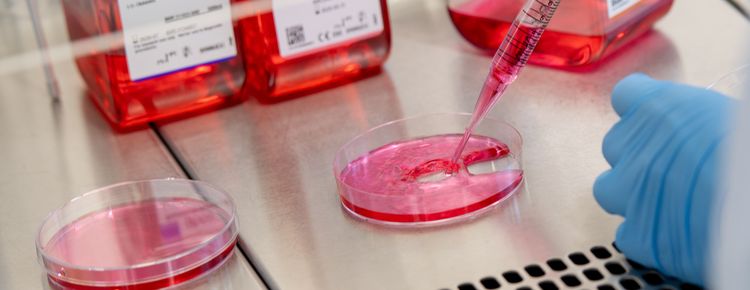Immunology
Contact
Director
Mailing address
Immunology

Immunology deals with the body's defence mechanisms against pathogens such as bacteria, viruses, fungi and parasites as well as other foreign substances (e.g. toxins or environmental toxins). The immune system is made up of a large number of cellular and molecular processes that are responsible for recognising and inactivating pathogens or foreign, "harmful" influences. Due to its central role in the human body, malfunctions of the body's own defences are involved in the development and progression of a wide variety of diseases, such as inflammation and infections, allergies, transplant rejection, autoimmune diseases and tumours.
Further information
Our research group investigates cellular and molecular mechanisms underlying the development of complex inflammatory diseases, systemic autoimmunity or the induction of tolerance. In addition, we deal with the regulation of innate and acquired immune responses in infections or the progression of tumours as well as the interaction of the immune system with the nervous system. With these approaches, we aim to better understand signalling pathways and processes underlying the control of cell activation, cell migration or cell-cell communication and thus contribute to the elucidation of pathomechanisms of (systemic) immune-mediated diseases or provide ideas for the development of innovative therapeutic concepts. Since the regulation of the immune system is not only determined by organs, tissues or cells of the organism itself, but can also be controlled by external factors (e.g. environmental influences, lifestyle factors), our work also includes analyses of the interaction between the environment and the organism. In this context, we are particularly interested in signalling pathways and mechanisms that mediate the transfer of external stimuli into immune responses. Furthermore, we deal with neurosensory processes and sensory perception in the eye as well as with the identification of biomarkers (genome and transcriptome analyses, also at single cell level) or the characterisation of changes in the microbiome in inflammatory diseases.
We use a wide variety of methods to provide targeted answers to our questions. These include, for example, complex cell culture systems or innovative animal models, many of which we have developed ourselves. We also use standard methods of immunology, histology, cell and molecular biology.
Teaching
- Immunology for the Human Medicine degree programme
- Immunology for the degree programme Molecular Biomedicine
Lectures and courses:
Summer term 2025
6.04.121 Tumor Biology - Lecture
6.04.150.003 Novel immunomodulatory tripeptides for the in vitro treatment of human immune and endothelial cells
OLT.25.05.01 OLTECH Mid-term Workshop 22.05.2025
For further information:
Research
The main research areas of the Division of Immunology include
- Neuroimmunology and Neuroimmune Communication
- Immune-Environment Interaction
- Immune Regulation, Systemic Autoimmunity and Tolerance Induction
- Control of Anti-Microbial and Anti-Tumoural Immunity in Epithelial Barrier Tissues
- Neurosensory Processes and the Role of the Immune System in Sensory Perception in the Eye
Here you can find an overview of the publications

